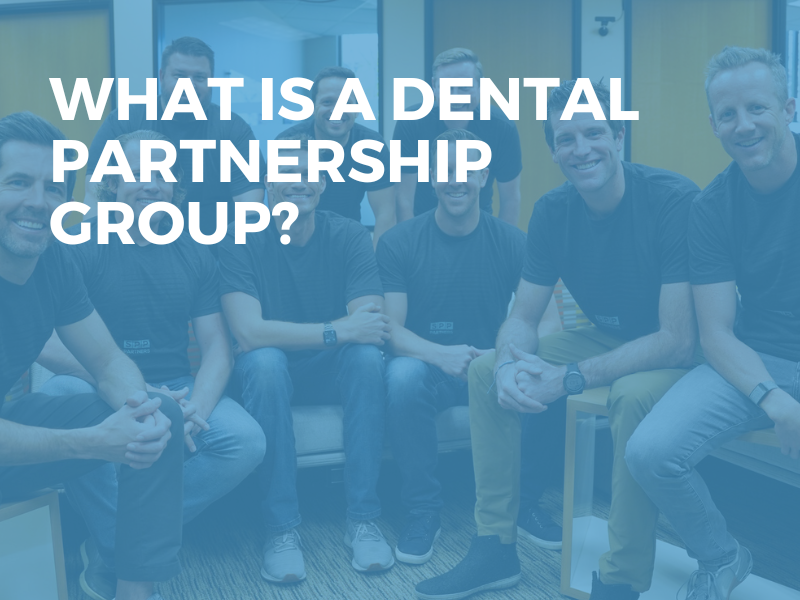The dental industry is evolving, and dental professionals are exploring new ways to balance clinical autonomy with business efficiency. One growing trend that reflects this shift is the rise of dental partnership groups. These groups offer a collaborative approach to dental practice ownership, providing a middle ground between independent private practices and larger corporate dentistry models, such as dental service organizations (DSOs). In this article, we’ll explore what a dental partnership group is, its key benefits, and how it fits into the broader landscape of the dental industry.

What Is a Dental Partnership Group?
A dental partnership group (DPG) is a collaborative business model where private practice dentists partner with a larger organization but retain significant control over their individual practices. Unlike a dental service organization (DSO) or a dental support organization, where management and ownership are often transferred entirely to a corporation, dental partnership groups offer dentists the opportunity to remain majority owners of their practices. In this model, dentists can focus on patient care while benefiting from the business support and resources provided by the group.
In simple terms, dental partnership groups are designed to preserve the autonomy of the dentist, while offering the financial and operational support that larger organizations provide. It allows dentists to maintain their private practice feel while taking advantage of economies of scale that come with being part of a larger group dental network.
How Does a Dental Partnership Group Differ From a DSO?
To understand dental partnership groups, it’s essential to compare them to the more widely known dental service organizations (DSOs) or dental support organizations. DSOs are corporate entities that provide business management and administrative support to dental practices, but in many cases, they also own the practices themselves. In this structure, dentists often have limited control over business decisions, such as staffing, marketing, and even patient scheduling, as these are managed by the DSO. Although you may have some say in those decisions, the final decision resides with the majority owner – the DSO.
Dental partnership groups, on the other hand, offer the benefits of shared resources and expertise, without the loss of control. The dentist retains majority ownership and autonomy over clinical decisions. The partnership model is particularly appealing to dentists who value their independence but recognize the challenges of running a practice in today’s complex and competitive marketplace. In addition, a dental partnership group like SPP, you enjoy the opportunity to participate in the financial upside that is typically reserved exclusively for the DSO.
Listen to this podcast on the differences between a DSO, DPO, and DPG!
Key Features of a Dental Partnership Group
Ownership Structure
The primary distinction of a dental partnership group is its ownership model. Dentists in these groups typically retain 51% or more of their practice ownership, ensuring they stay in control of their clinical operations. The partnership group holds a minority stake, which allows for financial collaboration without diminishing the dentist’s role as the leader of their practice. This model is highly attractive to dentists who want to maintain their identity as private practitioners but also want access to resources that can help them grow and operate their businesses more efficiently.
Autonomy and Clinical Control
Unlike in corporate dentistry, where decisions may be influenced by the larger organization’s goals, dentists in a dental partnership group retain full control over their clinical practices. They decide on the treatment protocols, patient care standards, and staffing needs. This autonomy is critical for dentists who wish to uphold a certain standard of care that reflects their values and approach to patient treatment.
Shared Resources and Support
One of the most significant advantages of joining a dental partnership group is access to shared resources. The group offers administrative, marketing, and technological support, which allows dentists to focus on patient care rather than the day-to-day operations of running a business. For example, tasks such as accounting, payroll, purchasing dental supplies, and marketing initiatives are supported and even directed at the group level, which reduces overhead costs, increases operational efficiency and frees up valuable time and energy at the practice level.
Being part of a group dental network can also open doors to continuing education, group purchasing power, and access to cutting-edge technologies. With shared knowledge and resources, practices in partnership groups are often able to offer more advanced treatments to their patients and provide the latest in dental technology.
Financial Opportunities
One of the unique financial benefits of a dental partnership group (DPG) is the opportunity to participate in the financial upside that occurs during a recapitalization or exit event. In a traditional DSO model, dentists often watch as the corporate entity reaps the financial rewards when the business is sold or recapitalized.
However, in a dental partnership group, because the dentist retains majority ownership, they have a direct stake in the financial success of the group. This means when a recapitalization or exit event occurs, the dentist shares in the profits, allowing them to benefit from the growth and increased valuation of the practice over time. This financial alignment creates a strong incentive for dentists to grow their practice and capitalize on future opportunities without losing control of their business.
Benefits of Joining a Dental Partnership Group
Access to Expertise and Resources
One of the major draws of dental partnership groups is the access to business and clinical expertise. Dentists are trained to provide high-quality care but may not have the time or knowledge to handle the complexities of running a business. A partnership group fills this gap by providing administrative support, marketing strategies, and financial advice, all while the dentist retains control of clinical decisions. This shared expertise can lead to better patient outcomes, smoother office operations, and increased revenue. In addition, dentists in a group can receive support from one another directly, allowing them to receive peer-to-peer feedback that can help them move forward.
Financial Growth and Stability
The financial benefits of a dental partnership group are substantial. By pooling resources, dentists can reduce the costs associated with running their practice. Shared marketing efforts, group purchasing discounts, and centralized billing processes all contribute to cost savings. Moreover, the ability to access capital for growth and expansion is another appealing feature. Dentists can invest in new technologies, expand their office space, or open new locations, all while having the financial backing of the group.
Another key financial benefit is the reduction of risk. With the support of the partnership group, dentists can navigate challenging economic conditions more effectively. The group offers stability and growth opportunities that solo practitioners may not have the resources to pursue independently.
Retaining Independence While Reducing Stress
Dentists often face burnout from the dual responsibilities of managing a practice and providing patient care. In a dental partnership group, the day-to-day stresses of business management can be handled by the group, allowing dentists to focus on what they do best—caring for patients. Dentists also maintain their independence and personal touch in how they run their practice, making this model ideal for those who want to avoid the corporate dentistry model while still reducing the administrative burden.
Challenges and Considerations
While dental partnership groups offer numerous advantages, they are not without challenges. One potential drawback is the need for alignment between the dentist and the group’s broader goals. In some cases, there may be conflicts around business decisions or strategic direction, particularly if the group wants to standardize certain processes across multiple practices.
Additionally, while dentists maintain clinical autonomy, they may still need to adhere to certain business frameworks set by the group. For some, this may feel restrictive compared to full independence. It’s crucial for dentists considering joining a dental partnership group to carefully evaluate the group’s values, goals, and management structure to ensure it’s a good fit for their practice.
The Future of Dental Partnership Groups
The rise of dental partnership groups reflects broader trends in the healthcare industry. As the costs of running a private practice increase and the pressure to adopt new technologies intensifies, many dentists are seeking collaborative models that allow them to thrive without sacrificing autonomy.
Experts predict that dental partnership groups will continue to grow in popularity, particularly as more dentists approach retirement and look for succession planning options that allow them to gradually reduce their workload while maintaining an ownership stake. Younger dentists, too, are drawn to these groups as a way to start their own practice with less financial risk.
Conclusion
In an industry where corporate dentistry and dental service organizations often dominate the conversation, dental partnership groups offer an exciting alternative. They combine the benefits of shared resources, financial growth, and business support with the independence and clinical autonomy that dentists value. For dental professionals looking to strike the right balance between running a successful business and providing high-quality patient care, dental partnership groups may be the perfect solution.
If you’re a dentist interested in exploring the benefits of joining a dental partnership group, we would love the opportunity to share more about SPP Partners. Speak with one of our doctors to hear about their personal experiences as part of the group.
